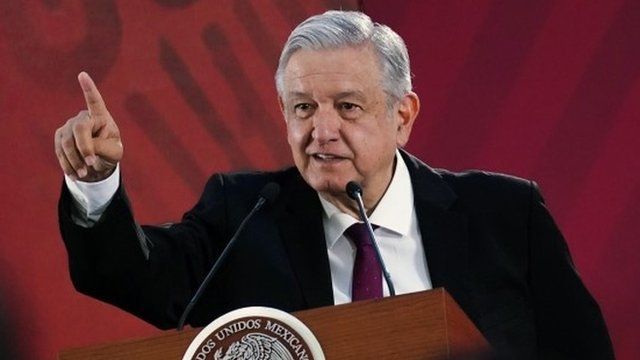© BBC / Reuters
In Switzerland, the election of a new Federal Councillor is only marginally noticed. We know that the newly appointed Federal Councillor will not bring any huge changes and will hardly influence the commissions in architecture and culture. On the other hand, major architectural projects in particular are regularly put to the vote. The population decides whether a project is carried out or not. The architect is aware from the outset that the project will be voted on and that there is a risk that it will not be carried out. Switzerland’s unique system of government offers a very important advantage: you can’t point the finger at anyone.
Here in Mexico, things work differently. Mexico has had a new president since December 2018: Andrés Manuel López Obrador, also abbreviated as AMLO, belongs to the left-wing Morena party. When I arrived in Mexico in March, it seemed to me that the people I talked to had not yet formed an opinion. Now I hear more and more criticism, especially from architects and artists. Grants for artists have been cut and architectural projects have been stopped, sometimes temporarily, sometimes permanently.
The most famous and controversial project that Amlo stopped was Norman Foster’s huge airport project in Mexico City, one third of which has already been completed. Most of the staff of the “Comisión Nacional de Vivienda”, the national department for housing promotion, were dismissed, as were countless staff of other departments. The entire work of the last president’s six years in office is being thrown overboard. Everything is being questioned.
In one architectural office I was told that several projects had been stopped, so that the team had to be cut down from 24 to 15 employees within a few months. Amlo’s justification for these changes is that the last government was corrupt and now needs to be cleaned up. The cancellation of the airport project in particular shows that a president in Mexico can turn everything around overnight. Many people have lost their jobs because of his clean-up actions. He in turn fills the jobs with his people and friends, which is again controversial. The political situation influences the everyday life of Mexicans much more than we are used to in Switzerland. AMLO’s actions are currently often seen as unpredictable and also contradictory. At the same time, Amlo is currently moving a lot in a country marked by violence and a lot of corruption.
The Foreign Office in Mexico is also understaffed at the moment. This is due to the same problem, that Amlo has dismissed most of its staff. As a result, visa applications are being processed with extreme delays. This in turn affects me directly. I should have received my visa almost two months ago. To this day, no one knows when I will get my work permit and thus my residence visa. Without a work permit, I cannot start my job as an architect with Tatiana Bilbao. I am currently practising patience.
To be able to understand the political situation of a country (to some extent), you have to know the country much more than I do. Also, the view from abroad is usually different from the view from within the country. Therefore, here is my impression as well as links to various media sources (as of 21.05.2019).
Many people find it a bit difficult to get used to the fact that Obrador gives a 1.5-hour speech every day. The aim is to feed information directly to Mexicans without interpretation from the media. The speeches can also be found on Spotify: https://open.spotify.com/show/52jMEv2EngPm0tFlsmMAnp?si=YWdrqp4XSKGtj3uJp4FWUw.
It is also important to understand that the profession of journalist is one of the most dangerous professions in Mexico, along with that of politician. Reporters without borders writes about Mexico’s situation: “[…] Mexico is one of world’s deadliest countries for the media.” Many journalists flee abroad to report on their country. All the more important, I was told, is to talk to the people to get a picture of the political situation or to read foreign reports.
(Most of the links mentioned are in German)
NZZ article on the election (02.07.2018):
https://www.nzz.ch/international/wahlen-in-mexiko-die-linke-triumphiert-ld.1400231
Tagesschau audio contribution shortly before taking office (30.11.2018): https://www.tagesschau.de/multimedia/audio/audio-63825.html
Tagesschau video contribution on taking office (02.12.2018): https://www.tagesschau.de/ausland/mexiko-praesident-vereidigt-101.html
Frankfurter Rundschau article shortly after taking office (09.12.2018):
https://www.fr.de/politik/bruch-politischen-system-10947683.html
Summaries from different perspectives after the first 100 days in office:
– https://www.stuttgarter-nachrichten.de/inhalt.bilanz-nach-100-tagen-der-neue-praesident-ruettelt-mexiko-ordentlich-durch.7398ef3f-6166-471c-a698-81a9abe48603.html
– https://www.peoplesworld.org/article/transforming-mexico-amlos-first-100-days/
– https://www.bbc.com/news/world-latin-america-47946959
– https://www.nzz.ch/international/mexiko-praesident-andres-manuel-lopez-obrador-bleibt-populaer-ld.1469149
Amlo made an unusual demand in March. He asked Spain to apologise for the conquest of Mexico some 500 years ago (note also Amlo’s Twitter video, which looks a bit unprofessional in my eyes):
https://www.zeit.de/politik/ausland/2019-03/kolonialzeit-mexiko-spanien-vatikan-entschuldigung
https://www.sueddeutsche.de/politik/mexiko-kinder-der-schaendung-1.4389058





